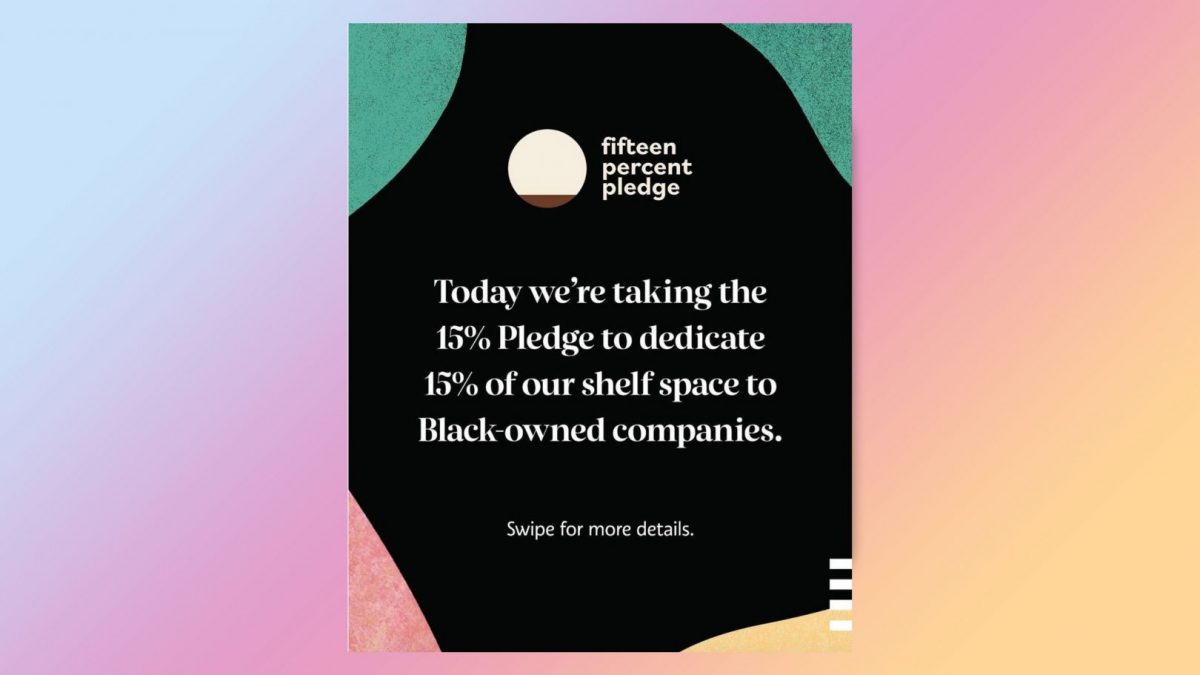When Aurora James founded the 15% Pledge, a nonprofit organization that asks retailers to commit to dedicating 15% of their inventory to Black-owned businesses, Sephora was one of the four major brands to whom she addressed the pledge on June 1. “Sephora is such a huge company, has so many stores, and is such a major touch point for so many women—and I also know how innovative they are,” James tells Vogue. “I’ve worked with them in the past, and I felt like they were in a really prime position to make this change.” Today, Sephora became the first retailer to take her up on the challenge.
“We were inspired to make the 15% Pledge because we believe it’s the right thing to do, for our clients, our industry and for our community,” Artemis Patrick, Sephora’s executive vice president and chief marketing officer, said in an emailed statement. “Ultimately, this commitment is about more than the prestige products on our shelves. It starts with a long-term plan diversifying our supply chain and building a system that creates a better platform for Black-owned brands to grow, while ensuring Black voices help shape our industry. We recognize we can do better and this pledge builds on our ongoing work to use our resources to drive meaningful and long-term change for Sephora and our industry.”
Together, James and Sephora have established a long-term commitment that will bring Black-owned beauty brands into Sephora’s stores and hold the retailer accountable for its pledge. “Part of why I created the 15% Pledge as an organization after I announced it as an idea was so that we could continue to stick around and actually hold them accountable and work with them in getting over the hiccups and the hangups that could come along the way. I’ve also committed to being a resource to some of these businesses to help them execute in a meaningful way,” James says. “That level of accountability is exactly why a company like Target would prefer to just donate $10 million instead of actually committing to a long-term change and committing to being accountable. I think that’s the difference between these donation requests versus the 15% Pledge,” she continues, explaining that while donations are necessary and beneficial, the commitment to change is what will help the 15% Pledge and Black-owned businesses be successful in the future.
Online, the announcement has resulted in a groundswell of support. “Sephora is such a huge business and their willingness to jump on board and do this in such a meaningful, holistic way really strips away the excuses that a lot of other retailers might have,” James says. “They are also committing to really sharing their strategies, methods, and goals publicly, so that will also lay a great roadmap for other companies to be able to follow.”
James is still hoping to get Whole Foods, Shopbop, and Target—the other three retailers she mentioned in her original post—to take the pledge. She’s also focusing on luxury fashion retailers. “If we talk specifically about fashion and about businesses like Shopbop, like Net-a-Porter, like MatchesFashion, like Moda Operandi, like Nordstrom, I think that it’s really about taking a look at the landscape, taking a look at which Black designers exist in the space who have product that fits in with your customer, and meeting with them and talking to them about what that looks like and then onboarding them in the way that you might take the care to onboard another huge brand,” James says. “We see, all the time, how these companies celebrate the onboarding of other brands in their marketing, in their press, and in their communication. We really want to see them do that same thing with Black-owned businesses as well—and to actively start seeking them out.”
Followers and supporters of the pledge can sign an online petition—James estimates it has almost 100,000 signatures so far—donate to the cause, and engage with and share @15percentpledge’s content. Meanwhile, James continues to support artisans around the world via her own business, Brother Vellies. “Doing this sort of thing puts a strain on me, emotionally,” she says. “Obviously I am still a Black person who is going through everything right now on the heels of a pandemic. It also puts a strain on my business. I’ve been working almost 20 hours a day on the Pledge since I launched it 11 days ago—that element is a lot.” (The Pledge will soon announce other officials.) “From the Brother Vellies perspective,” she explains, “we launched the Something Special program. That’s my specific program to help support our artisan partners around the world. Jumping on board for something like that, which is a monthly commitment of $35, is really helpful for our community too.”
She continues, “I’m not going to stop, and anyone who is interested in talking in those companies, we welcome them reaching out. There are some conversations that are ongoing that I hope can turn into more exciting announcements in the future. This is really about standing up for economic equality and racial justice. People are like, ‘Well, it’s a lot of work.’ You know what? Black people in America have been working really hard for a really long time. I don’t think that’s an excuse. The time to act is now and I think that we are always going to remember the companies that stood with us and those that chose to stand silent in this moment because their silence is deafening.”

